Customer spotlight: Nester Hosiery, the mill behind Farm to Feet™ socks
We recently interviewed Nester Hosiery’s Dane Nester, Creative Lead, and Katie Kumerow, Sustainability Manager, to learn more about its operations in Mount Airy, North Carolina.
Dec 19, 2018
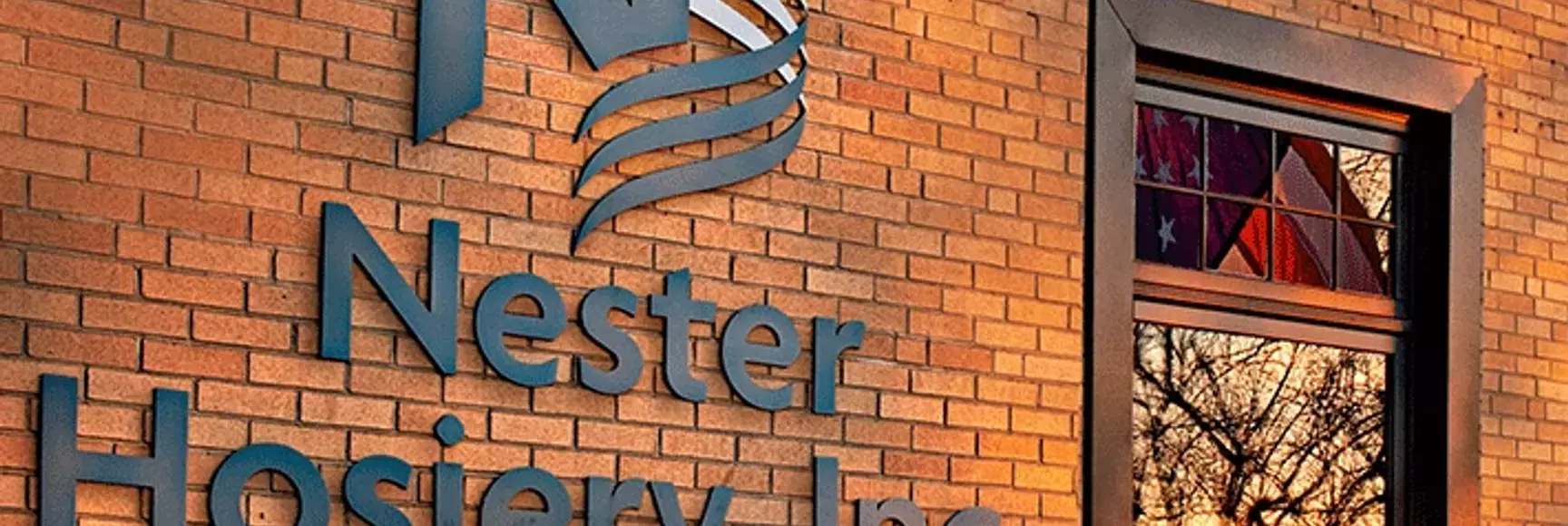
Nester Hosiery: A Family Business
We recently interviewed Nester Hosiery’s Dane Nester, Creative Lead, and Katie Kumerow, Sustainability Manager, to learn more about its operations in Mount Airy, North Carolina.
Nester Hosiery is an industry leader when it comes to promoting sustainability and prides itself on its environmental stewardship and its safe work environment. Nester produces wool sport socks on cutting-edge equipment that use innovative fibers from The LYCRA Company to deliver exceptional comfort, a fabulous fit and lasting performance.
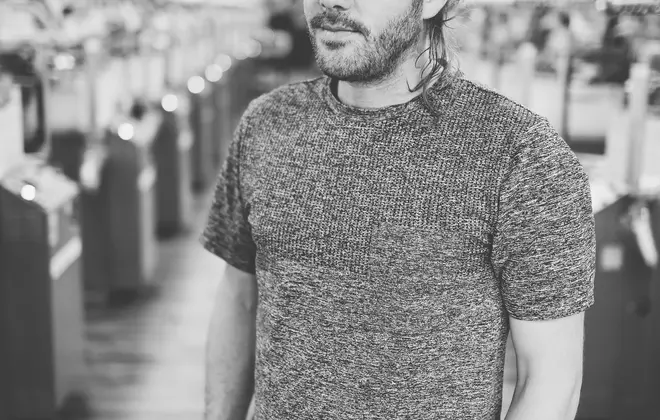
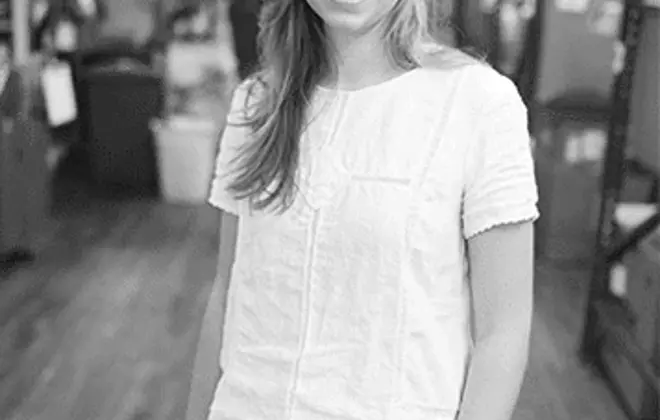
Can you give us a brief history of Nester Hosiery?
Dane Nester (DN): We were founded in 1993. In the mid-90s the future of American manufacturing looked bleak as many factories shut down and jobs went overseas. We realized we needed to make some big changes and have a clear vision for the business to survive. We retooled and invested in state-of-the-art equipment to expand the company’s capabilities. Nester Hosiery became a fully integrated business focused on specialty wool socks. Over the years, we’ve continued to reinvest in the business by upgrading our knitting machines, developing software to improve efficiency, and increasing production to meet global demand. In our first 25 years, we’ve moved four times into larger facilities and have grown to over 200 employees. We even launched our own premium brand of 100% American socks called Farm to Feet™ in 2013.
What is Nester Hosiery’s core business today?
DN: We’re a private-label manufacturer of high-quality performance socks for leading brands in the outdoor industry. We also produce socks for our own Farm to Feet™ brand, as well as licensed brands. The socks we produce are made with quality ingredients including merino wool, nylon, LYCRA® fiber spandex and performance fibers like COOLMAX® and THERMOLITE® technologies, which are known for their advanced cooling and warming benefits.
Why did you choose The LYCRA Company’s fibers over competing brands?
DN: We tried using generic fibers, but they simply didn’t offer the consistent quality or the supply chain transparency we needed to ensure consumers will feel good about wearing our products. The generic fibers kept breaking during the manufacturing process, which ended up costing us money in downtime. We also appreciate The LYCRA Company’s focus on innovation, its technical support and the high consumer brand awareness of its fibers that helps drive sales.
Can you tell us about your quality control process?
DN: We check quality throughout the manufacturing process and use software to check our socks for 30 different quality issues. Our technicians use tablets to monitor production and are alerted if an issue is detected so they can correct it immediately. Quality is engraved into everyone’s role here at Nester Hosiery.
That software sounds impressive. Is it something Nester developed?
DN: Yes, we’re software developers as much as we are sock manufacturers. We’ve partnered with a software company to develop SockInfo®, our own customized enterprise management system. It allows us to manage every aspect of our business from raw materials to finished goods. All of our operators can follow the entire production process in real time on their tablets.
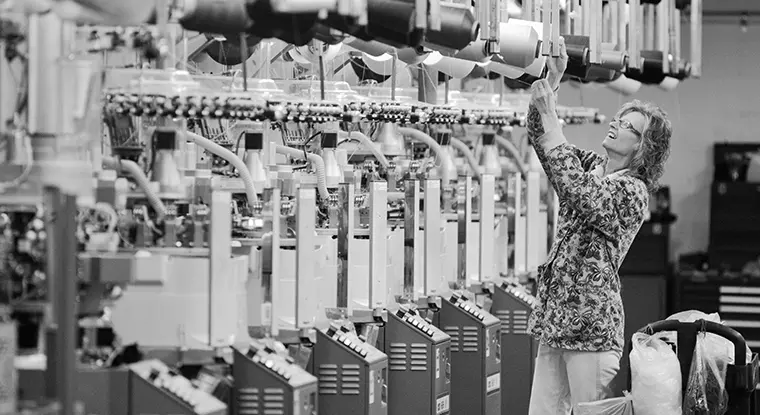
An employee at Nester Hosiery checks a knitting machine during production.
What are your company’s technical capabilities?
DN: We offer a wide range of capabilities to our customers. We don’t specialize in a single type of knitting; instead, we offer a range of 54 needle to 200 needle knitting machines to create a variety of socks using a multitude of specialty and performance fibers. We offer sock finishing, advanced steam boarding and packaging, too. We’re also one of the few companies today using 200 needle machines to create performance socks—the highest density used. This enables us to create high-quality sport socks that are finer, stronger and built to last longer than 100 needle socks, for example.
How does product development work at Nester? Do customers or consumers participate?
DN: For our Farm to Feet™ brand and private label retailers we do most of the design and product development ourselves. In addition, we often work with the Catawba Valley Community College’s Manufacturing Solution Center to develop new products, create prototypes, and perform tests to improve product quality.
Sock innovation is clearly important to your business. What makes your socks unique?
DN: We’re obsessed with quality and bring 25 years of manufacturing experience to every sock we make. We work closely with our brands to design and develop socks that fit their needs and ultimately the consumers’ needs. For example, we were one of the first manufacturers to embrace seamless toe technology, which made a huge difference in creating comfortable performance socks. We are also one of the few companies making 200 needle socks, and the only U.S. based hosiery manufacturer to become a bluesign® system partner.
This seems like a good time to introduce Katie Kumerow, Nester Hosiery’s Sustainability Manager. Katie, can you tell us about bluesign® and what it means for your business?
Katie Kumerow (KK): We’re focused on managing our supply chain responsibly, and to help us do this, we became a bluesign® system partner in 2016. This system helps us track and manage chemicals in the supply chain, eliminate toxic ingredients from our products up front, and promotes sustainable textile production. Typically, impurity tests are only performed on a finished product. At that point it’s extremely difficult to look back at the production process to determine which supplier was responsible for introducing the substance. The bluesign® system looks at input stream management and focuses on removing toxic chemicals from the supply chain at the beginning. This way it doesn’t get into the finished product and our workers aren’t exposed to it either.
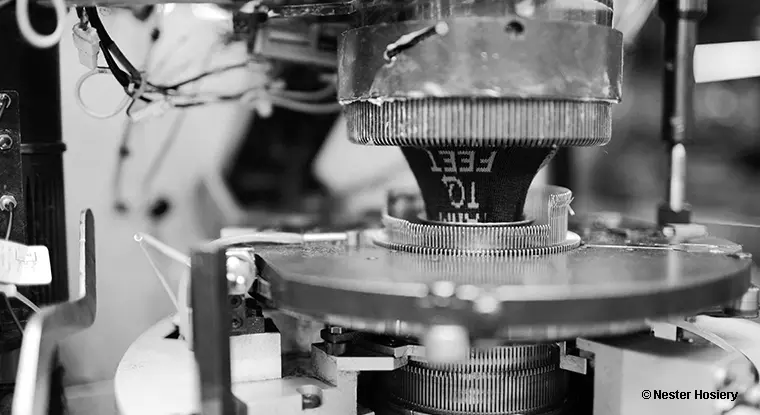
A 100% American Farm to Feet™ sock being knitted at Nester Hosiery in Mount Airy, North Carolina.
Does Nester have any other certifications? Do you promote them on packaging?
KK: Farm To Feet™ is committed to responsible forestry and began purchasing Forest Stewardship Council (FSC) packaging materials in 2017. Earlier this year, we redesigned our Farm to Feet™ packaging to feature the Council’s seal, as well as different workers telling our 100% American supply chain story. We also added care instructions written with the environment in mind. We encourage consumers to wash their socks less and let them air dry. This will extend the life of their socks, which is more sustainable than buying a new pair. In addition, Nester Hosiery became Responsible Wool Standard (RWS) certified in 2017, and a few customers have been using the certified wool since then. We only use wool from ranchers that are certified to meet this voluntary standard. RSW ensures the welfare of sheep (with respect to their Five Freedoms) and promotes best practices in land management. We anticipate a lot of growth in this area because today’s socially-conscious consumers want to make sure that animals weren’t harmed to make their socks.
How do you maintain supply chain transparency?
KK: We’ve adopted resources the apparel industry has created including the Higg Index, which we helped pilot many years ago. Manufacturers and brands in the outdoor industry segment saw a need to accurately measure and score a company’s sustainability performance. This tool provides a consistent assessment across the industry where businesses benchmark against each other. We work with our suppliers to meet these industry standards. We also have plans to implement the Social & Labor Convergence Project (SLCP) in our Farm To Feet™ supply chain, once the tool becomes available next year. The SLCP aims to improve working conditions across the apparel supply chain. This industry-owned self-assessment tool collects labor compliance and performance data and will be a great resource in the future.
Why is sustainability so important to Nester?
KK: We believe it’s the best way to do business. Our leadership has been a catalyst for change in the textile industry for years. We understand that the planet has limited natural resources, and sustainability has a positive impact on our community, our day-to-day operations and our bottom line. We save money when we reduce waste, become more efficient, keep employees safe, and avoid risks. I’m proud that we’ve helped guide the industry in this direction, and we forged a path for other companies to follow.
All photos courtesy of Nester Hosiery Inc.
Farm to Feet™ is a trademark of Nester Hosiery.
LYCRA®, COOLMAX®, and THERMOLITE® are trademarks of The LYCRA Company.
Contacts
-
Farm to Feet™ socks
Michael Collin
PR - 美国
-
The LYCRA Company
Jenifer Strong
Senior Strategic Account Manager (Legwear) – North America - 中国